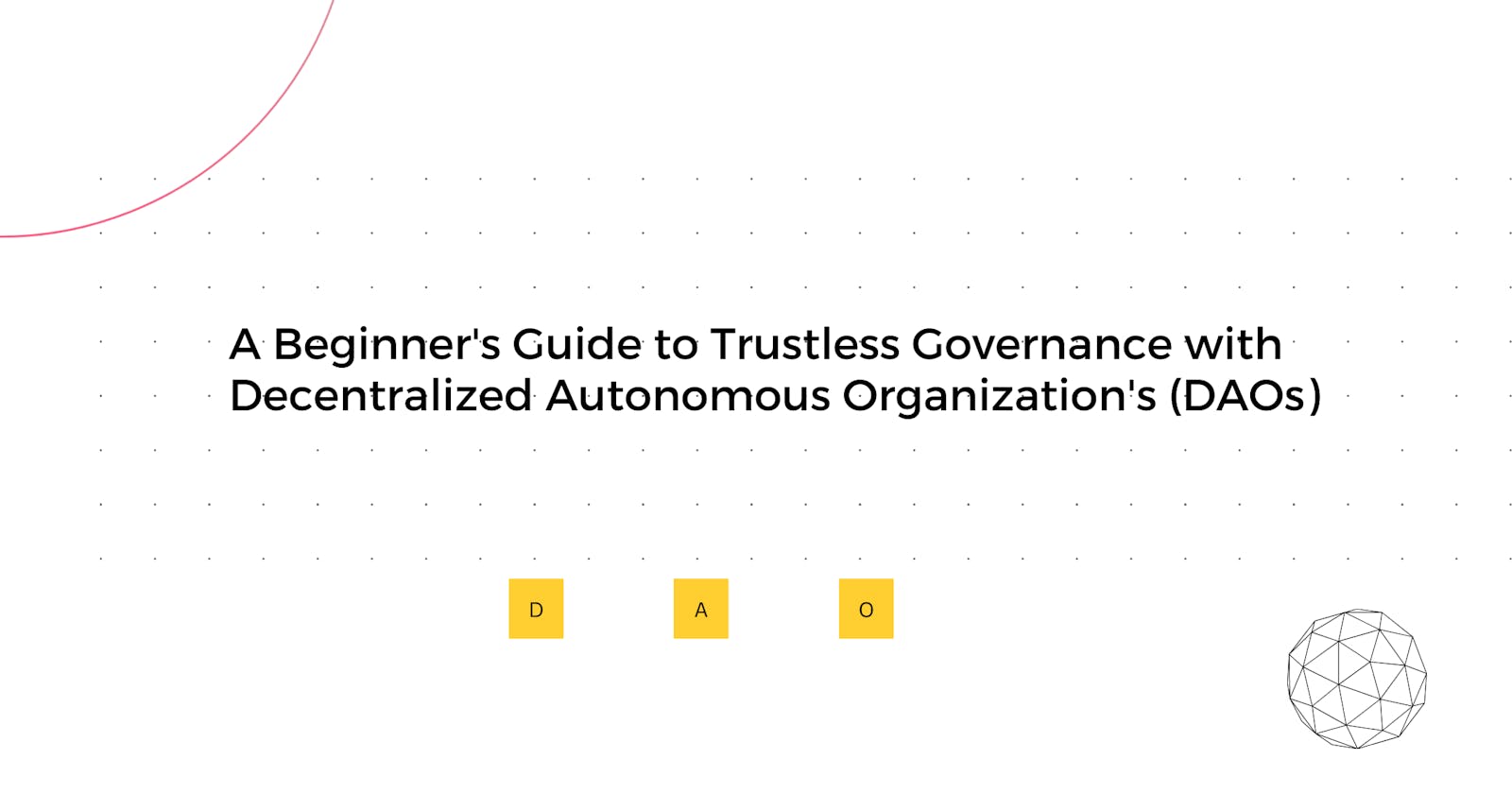A Beginner's Guide to Trustless Governance with Decentralized Autonomous Organizations(DAOs)
Introduction
In recent times, traditional models are coming under more and more criticism for their limitations in the governance sector.
Due to the shortcomings, the demand for decision-making processes that are more inclusive, transparent, and efficient has been sought for, giving rise to the need for decentralized alternatives. A rising example of this kind of innovation is the Decentralized Autonomous Organization, or DAO.
In this article, we will be exploring DAOs role in building trustless governance and their potential impact on various industries.
Comprehending Decentralization:
Understanding DAOs requires a basic understanding of decentralization which lies at the heart of DAOs.
Decentralization is an idea that aims to share decision making and control throughout a network in order to reduce the risks brought on by a centralized authority or single point of failure.
Beyond DAOs, security and transparency are key requirements to technological advancement and existence. Technologies such as blockchain, implements the decentralized approach, providing transparency and security via a distributed ledger.
What is a DAO?
Fundamentally, a Decentralised Autonomous Organisation(DAO) is an institution that is governed by consensus and code rather than by a central authority.
DAOs differ from conventional organizational models in that they do not have a single decision-maker. Rather, they depend on group decision-making, giving individuals the ability to influence the organization's course. Everything in DAOs is powered by a line of instruction known as codes, it has no human interference.
What is The Bedrock for DAOs?
DAOs are fundamentally built on blockchain, the amazing technology that powers cryptocurrencies like Bitcoin. Decision-making inside DAOs is greatly aided by smart contracts, which are self-executing agreements with the terms of the agreement encoded directly into the code. Transparency and confidence in the application of established regulations are guaranteed by the union of blockchain technology and smart contracts.
DAOs are transforming industries in real time; they are not just theoretical ideas. Within the field of decentralized finance (DeFi), DAOs are essential for financial transactions such as borrowing and lending. Furthermore, DAOs are causing a stir in the art world, where group decision-making is steering artistic endeavors in new directions. DAO-funded and -governed community-driven projects demonstrate the flexibility of this new governance paradigm.
Benefits of DAOs
DAOs provide a manifold of benefits. Since every transaction and judgment is publicly available on the blockchain, transparency is essential. By lowering the possibility of fraud or manipulation, cryptographic techniques and decentralized architecture improve security. Another important advantage is efficiency, which is enhanced by smart contracts and automated procedures that simplify decision-making.
Here are some of the benefits of DAOs;
• Global Collaboration:
DAOs facilitate collaboration on a global scale, by building trust into the code, reducing the reliance on trust in individual entities or authorities, thereby allowing individuals and communities to become borderless. Particularly, In situations where trust is difficult to establish, this trustless governance model becomes a valuable asset.
• Equality in Control
Decentralized Autonomous Organizations, does not only provide trustless architectures but also engages in promoting and establishing a one-one control system, where there is no central authority or decision maker as everybody in the governance has equal rights and power.
• Enhanced Security
Smart contracts, which are self-executing and impervious to tampering, are the basis of DAOs. This lowers the possibility of deception, manipulation, or illegal modifications to the organization's by-laws. By eliminating the weaknesses found in centralised systems, DAOs' distributed architecture makes them resistant to single points of failure and improves security.
The DAOs Bottlenecks
Although DAOs present a potential method for governance, there are certain difficulties with them. The integrity of DAOs is at risk from security issues, including flaws in smart contracts. As the legal system tries to keep up with the quick development of decentralised technology, regulatory uncertainties also loom large. The necessity for meticulous deliberation is further highlighted by internal obstacles such community disagreements and impasses in decision-making.
How to Participate in a DAO
If you have been intrigued so far with the idea of DAOs, getting started as a participant is relatively easy but it requires having a compressive knowledge of their dynamics. Your first steps into DAO involve learning, obtaining and utilizing the native means of exchange in DAOs , which is cryptocurrencies. You will need to navigate through cryptocurrency exchanges, discover and set up digital wallets, and effectively contribute to the decision-making processes of the DAO.
The Future of DAOs
A paradigm shift can be seen when comparing DAOs to conventional governance systems. DAOs provide an alternative to traditional organisations' hierarchical structure by being more inclusive, transparent, and interactive. DAO coexistence with conventional governance models raises concerns regarding future compatibility and the possibility of a hybrid approach.
DAOs seem to have a bright future as they continue to gain popularity. The possibility of broad adoption in a number of industries points to a paradigm change in the way businesses function. Impacts on society and the economy are anticipated, and DAOs have the ability to redefine what it means to have trust in governance frameworks.
Ethical Considerations
Even while DAOs present fascinating opportunities, moral issues should not be disregarded. Because DAOs are decentralized, appropriate governance is necessary to address issues of accountability, justice, and inclusivity. Maintaining a sustainable development of DAOs requires striking a compromise between ethical ideals and technological progress..
Conclusion
In summary, Decentralized Autonomous Organisations are heralding a new era of trustless governance. Their dependence on smart contracts and blockchain technology guarantees efficiency, security, and transparency. It is critical that we take into account the possible advantages, difficulties, and ethical ramifications of DAOs as we traverse this changing terrain. Understanding decentralized organizations (DAOs) is essential to realizing their transformative potential in the digital era, whether one chooses to participate in them or just observes their effects.
